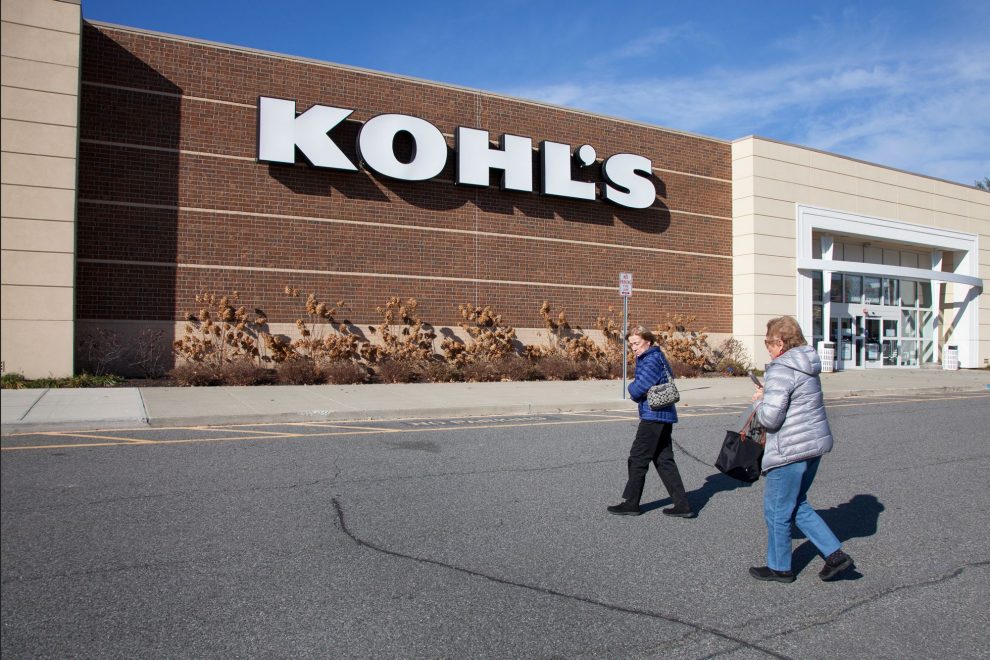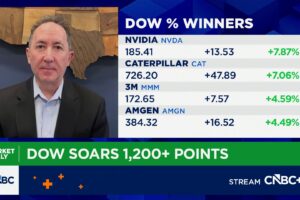
Kohl’s and JC Penney delivered disappointing first-quarter earnings reports Tuesday morning, putting a damper on other department stores, as their stocks tumbled.
Shares of Kohl’s fell 13%, and Penney shares were down 8% in early trading. Macy‘s stock was down 1.5%, Nordstrom‘s stock dropped 1% and Dillard’s fell 1.2%.
Penney’s net loss nearly doubled during the quarter, while Kohl’s missed same-store sales expectations for the first time in two years.
America’s department stores continue to struggle because more consumers are opting to buy things online from places like Amazon, Rent the Runway and Stitch Fix or are heading directly to brands like Nike and Kate Spade to buy items from them.
Faced with these challenges, Kohl’s and Penney have taken different approaches to wow customers. Kohl’s has been leaning into its success selling brands like Nike and Under Armour by devoting more square footage in some stores to athletic apparel. It’s also dividing up some of its shops to lease space next door to tenants like discount grocery store chain Aldi and Planet Fitness.
Penney, which analysts argue is in a worse position than Kohl’s because its stores are typically within antiquated shopping malls, has shut dozens of stores over the years, hoping a pruning of its real estate will allow it to focus on more profitable locations. But its sales continue to drop, and it hasn’t benefited as much from rival Sears’ struggles as anticipated.
Kohl’s on Tuesday missed earnings expectations and slashed its outlook for the full year. The retailer’s tie-up with Amazon, where it’s been accepting Amazon returns at certain locations, hasn’t yet moved the needle on Kohl’s sales. But that returns program is going nationwide this summer, and Kohl’s said it expects to meaningfully boost foot traffic, and hopefully sales.
Kohl’s reported adjusted earnings of 61 cents a share on sales of $4.09 billion. Analysts were calling for earnings per share of 68 cents on revenue of $3.94 billion, based on Refinitiv data.
Sales at Kohl’s stores open for at least 12 months fell 3.4%, while analysts were calling for a drop of just 0.2%.
Kohl’s said it now expects adjusted earnings per share to fall within a range of $5.15 to $5.45, compared with an earlier estimate of $5.80 to $6.15. Analysts had been calling for earnings of $6.04 per share.
CEO Michelle Gass said the year “started off slower than we’d like.” She said Kohl’s home-goods business underwhelmed, as a cooler, wetter start to spring hurt sales of spring goods. But she called these “temporary” issues.
Penney also missed Wall Street’s earnings and same-store sales estimates. The company attributed a drop in sales to its decision in February to halt selling appliances in stores. CEO Jill Soltau said the company is “working to reestablish the fundamentals of retail.”
Penney reported a net loss of 46 cents per share on sales of $2.56 million. Analysts were calling for a net loss of 38 cents a share on sales of $2.56 million.
Penney’s same-store sales dropped 5.5%, worse than an expected drop of 4.2%.
The results aren’t as strong of those of Macy’s, which just last week crushed Wall Street estimates. But Macy’s sales during the first quarter still were down from a year earlier as the department store operator looks for ways to refresh its bricks-and-mortar stores to keep them exciting for customers, just like its rivals.
All of these companies and Nordstrom, which is set to report quarterly earnings after the bell on Tuesday, also have the threat of additional tariffs on footwear and apparel hanging over them. The White House is still considering new 25% tariffs on roughly $300 billion of goods from China, including clothing.
The 25% tariffs would have a significant impact on Penney’s in-house brands, Soltau told analysts Tuesday on a post-earnings conference call. Gass called it a “fluid situation.”
Including Tuesday’s losses, Kohl’s shares are down about 1% from a year ago, bringing its market cap to about $9 billion. Penney, which has a market cap of roughly $335.4 million, has watched its stock fall about 55% over the past 12 months.











